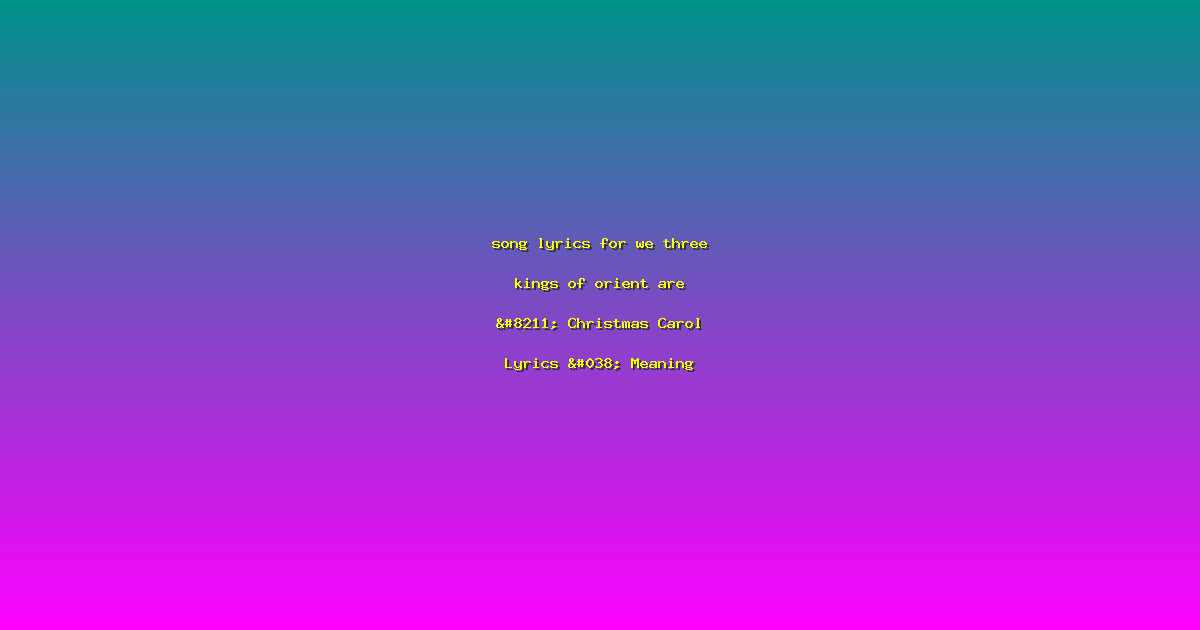song lyrics for we three kings of orient are – Christmas Carol Lyrics & Meaning
Every year, as the holiday season approaches, the familiar tune of “We Three Kings of Orient Are” fills the air in churches, homes, and community gatherings. This beloved Christmas carol has a rich history and deep meaning that goes beyond its catchy melody. Whether you’re a long-time fan or just curious about the lyrics, understanding the story behind this song can add a new layer of appreciation to your holiday traditions. In this article, we’ll delve into the origins, the significance of the lyrics, and the cultural impact of “We Three Kings of Orient Are.”
The Origins of “We Three Kings of Orient Are”
The song “We Three Kings of Orient Are” was written in 1857 by John Henry Hopkins Jr., an Episcopal priest and bishop. Hopkins was a prolific writer of hymns and carols, and this particular song was composed for a Christmas pageant at the General Theological Seminary in New York City. The lyrics are based on the biblical account of the Magi, or wise men, who traveled to Bethlehem to pay homage to the newborn Jesus.
- Historical Context: The song was written during the Victorian era, a time when Christmas traditions were becoming more widespread and popularized in the United States.
- Original Publication: The carol was first published in Hopkins’ book “Carols, Hymns, and Songs” in 1863, and it quickly gained popularity.
- Author’s Background: Hopkins was not only a priest but also a writer, editor, and teacher, which allowed him to craft lyrics that resonated with both religious and secular audiences.
The Meaning Behind the Lyrics
The lyrics of “We Three Kings of Orient Are” are rich with symbolism and biblical references. Each verse represents one of the three wise men, and their gifts to the baby Jesus. The song’s lyrics are a testament to the journey of faith and the importance of giving.
- Gold, Frankincense, and Myrrh: The gifts mentioned in the song—gold, frankincense, and myrrh—symbolize wealth, divinity, and suffering, respectively. These gifts were not just material offerings but also represented the wise men’s acknowledgment of Jesus’ divine nature.
- Guided by a Star: The wise men were guided by a star, which symbolizes divine guidance and the light of Christ. This imagery is a powerful reminder of the hope and guidance that faith can provide.
- Modern Interpretation: Today, the song is often sung during Christmas Eve services and carol concerts, serving as a reminder of the true meaning of the holiday season.
The Cultural Impact of “We Three Kings of Orient Are”
Over the years, “We Three Kings of Orient Are” has become an integral part of Christmas celebrations around the world. Its enduring popularity is a testament to its timeless message and beautiful melody. The song has been recorded by numerous artists and has been featured in countless films and television shows, further cementing its place in popular culture.
- Artistic Interpretations: Many artists have put their own spin on the song, creating unique arrangements that blend traditional and contemporary styles.
- Community Sing-Alongs: The song’s catchy tune and repetitive structure make it a favorite for community sing-alongs, fostering a sense of unity and shared joy during the holiday season.
- Education and Reflection: Schools and churches often use the song as a teaching tool, helping children and adults alike to understand the biblical story of the Magi and the significance of their gifts.
Frequently Asked Questions
What is the origin of the song “We Three Kings of Orient Are”?
Written by John Henry Hopkins Jr. in 1857, “We Three Kings of Orient Are” was composed for a Christmas pageant at the General Theological Seminary in New York City. It was first published in 1863 in Hopkins’ book “Carols, Hymns, and Songs.”
What do the gifts of gold, frankincense, and myrrh symbolize?
The gifts of gold, frankincense, and myrrh symbolize wealth, divinity, and suffering, respectively. Gold represents Jesus’ kingship, frankincense his divinity, and myrrh his mortality and the suffering he would endure.
How has “We Three Kings of Orient Are” influenced modern Christmas traditions?
The song has become a staple of Christmas celebrations, often featured in church services, carol concerts, and community sing-alongs. Its enduring popularity has made it a beloved part of the holiday season for many.
Is “We Three Kings of Orient Are” based on a true story?
The song is based on the biblical account of the Magi, or wise men, who traveled to Bethlehem to pay homage to the newborn Jesus. While the exact details of their journey are not fully known, the story has been a part of Christian tradition for centuries.
Are there any notable performances or recordings of “We Three Kings of Orient Are”?
Yes, the song has been recorded by numerous artists, including classical choirs, contemporary musicians, and even in film soundtracks. Its versatility has allowed it to remain relevant across different genres and generations.
Conclusion
Understanding the lyrics and meaning behind “We Three Kings of Orient Are” can deepen your appreciation for this beloved Christmas carol. From its historical origins to its cultural impact, the song continues to inspire and unite people during the holiday season. Whether you’re singing it in a church choir or listening to it on the radio, the timeless message of faith, hope, and giving remains as relevant today as it was when the song was first written. So, the next time you hear “We Three Kings of Orient Are,” take a moment to reflect on its rich history and the profound meaning behind its lyrics.
